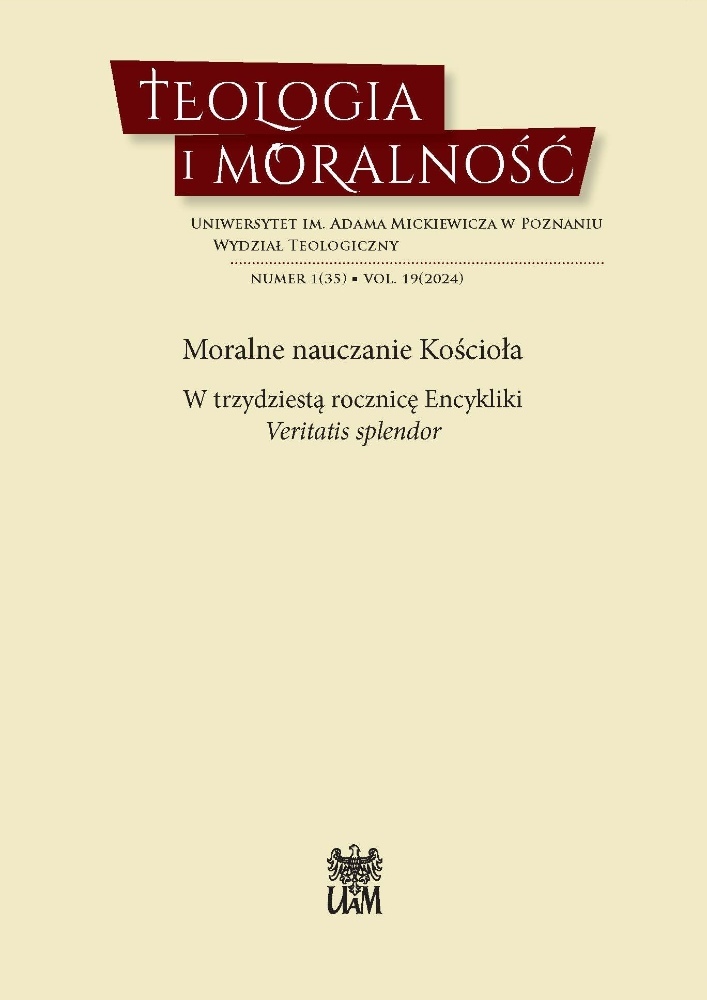Abstract
Abstract: This paper examines the historical and theoretical background of Veritatis Splendor, John Paul II’s encyclical letter specifically devoted to fundamental moral theology. With the reforms of the Council of Trent, moral theology had taken a juridical turn, being understood primarily as a discipline for confessors. In the late nineteenth and early twentieth centuries, the resulting manualist tradition was increasingly seen as inadequate, unable to speak to people’s lives. At the same time, the two world wars impetus the philosophical movement of existentialism. Through situation ethics, some tendencies of existentialist thought found their way into moral theology. Pius XII saw the need to respond to this development. The Second Vatican Council was regarded as an opportunity for a new presentation of moral theology that would overcome the limits of manualism and pay more attention to questions of conscience, the use of Scripture, and the emphasis on Christian discipleship. The Fathers rejected the draft originally prepared by a dedicated commission as inadequate, but they were unable to produce a new text. However, at least some issues of moral theology were discussed in other conciliar writings, notably Gaudium et spes and Optatam totius. The publication of Humanae vitae in 1968 proved to be a catalyst for some of the most difficult and central questions of fundamental moral theology, including the topic of intrinsically evil acts. In 1987, John Paul II finally announced that the Holy See would publish a document devoted to these issues. This text saw the light of day six years later and took the name Veritatis Splendor.
References
Acta Synodalia Sacrosancti Concilii Oecumenici Vaticani II. 1971. Volumen I, Periodus Prima: Pars IV, 695-717. Vatican City: Typis Polyglottis Vaticanis.
Arendt, Hannah. 1958. The Human Condition. Chicago: University of Chicago Press.
Arendt, Hannah. 1978. “Heidegger at Eighty.” In: Heidegger and Modern Philosophy: Critical Essays, edited by Michael Murray, 293-303. New Haven: Yale University Press.
Curran, Charles E. 2018. Diverse Voices in Modern US Moral Theology. Washington DC: Georgetown University Press. DOI: https://doi.org/10.1353/book62428
Curran, Charles E. et al. 1969. Dissent in and for the Church. Theologians and Humanae Vitae. New York: Sheed and Ward.
Denzinger, Heinrich and Peter Hünermann. 2012. Enchiridion Symbolorum: Compendium of Creeds, Definitions and Declarations on Matters of Faith and Morals. San Francisco: Ignatius Press.
German Bishops’ Conference, 1968. “Wort der deutschen Bischöfe zur seelsorgerlichen Lage nach dem Erscheinen der Enzyklika Humanae vitae.” In: Paul VI. Enzyklika “Humanae vitae”. Über die Weitergabe des menschlichen Lebens, 63-71. Trier: Paulinus-Verlag.
Granito, Alessandra. 2015. “‘A Great Awakener’: The Relevance of Søren Kierkegaard in Karl Jaspers’ Aneignung und Polemik.” Kierkegaard Studies Yearbook, 20: 249-267. DOI: https://doi.org/10.1515/kierke-2015-0113
Grisebach, Eberhard. 1928. Gegenwart. Eine kritische Ethik. Halle: Niemeyer.
Häring, Bernhard. 1968. Krise um “Humanae vitae”. Frankfurt am Main: Verlag Gerhard Kaff ke.
Häring, Bernhard. 1976. Embattled Witness. Memories of a Time of War. New York: Seabury Press.
Häring, Bernhard. 1993. “A Distrust that Wounds.” The Tablet, 247: 1378-1379.
Heidegger, Martin. 1927. Sein und Zeit. Halle: Max Niemeyer Verlag.
Hill, Brennan R. 2006. “Bernard Häring and the Second Vatican Council.” Horizons, 33: 78-100. DOI: https://doi.org/10.1017/S0360966900002966
Jaspers, Karl. 1932. Philosophie. Berlin: Springer.
John Paul II. 1987. “Discourse to the International Congress of Moral Theology.” In: Persona, verità e morale. Atti del Congresso Internazionale di Teologia Morale (Roma, 7-12 aprile 1986), 11-14. Rome: Città Nuova.
John Paul II. 1987. “Apostolic Letter Spiritus Domini.” Acta Apostolicae Sedis, 79: 1365-1375.
John Paul II. 1993. Encyclical Letter “Veritatis Splendor”. Access: 07.07.2023. https://www.vatican.va/content/john-paulii/en/encyclicals/documents/hf_jp-ii_enc_06081993_veritatis-splendor.html.
Keenan, James F. 2010. A History of Catholic Moral Theology in the Twentieth Century: From Confessing Sins to Liberating Consciences. New York: Continuum.
Kennedy, Terence. 2013. “Bernhard Häring and Domenico Capone’s Contribution to Vatican II.” Studia Moralia, 51: 419-442.
McBride, William L. 1995. “Sartre’s Debt to Kierkegaard. A Partial Reckoning.” In: Kierkegaard in Post/Modernity, edited by Martin J. Matuštík and Merold Westphal, 18-42. Bloomington: Indiana University Press.
Paul VI, 1968. Encyclical Letter “Humanae vitae”. Access: 07.07.2023. https://www.vatican.va/content/paul-vi/en/encyclicals/documents/hf_p-vi_enc_25071968_humanae-vitae.html.
Pinckaers, Servais. 1996. The Sources of Christian Ethics. Edinburgh: T&T Clark.
Pius XI. 1930. “Encyclical Letter Casti connubii.” Acta Apostolicae Sedis, 22, 539-592.
Pius XII, 1951. “Allocution to midwives.” Acta Apostolicae Sedis, 43: 835-854.
Pius XII. 1952a. “Nuntius Radiophonicus De conscientia christiana in iuvenibus recte eff ormanda.” Acta Apostolicae Sedis, 44: 270-278.
Pius XII. 1952b. “Ad Delegatas Conventui internationali Sodalitatis vulgo nuncupatae Fédération Mondiale des Jeunesses Féminines Catholiques.” Acta Apostolicae Sedis, 44: 413-419.
Scheler, Max. 1916. Der Formalismus in der Ethik und die materiale Wertethik. Halle: Niemeyer.
Second Vatican Council.1965a. Decree “Optatam totius”. Access: 07.07.2023. https://www.vatican.va/archive/hist_councils/ii_vatican_council/documents/vat-ii_decree_19651028_optatamtotius_en.html.
Second Vatican Council. 1965b. Pastoral Constitution “Gaudium et spes”. Access: 07.07.2023. https://www.vatican.va/archive/hist_councils/ii_vatican_council/documents/vat-ii_const_19651207_gaudium-et-spes_en.html
Steinbüchel, Theodor. 1938. Die philosophische Grundlegung der katholischen Sittenlehre (Handbuch der katholischen Sittenlehre I/1. Düsseldorf: Patmos.
Thonhauser, Gerhard. 2016. Ein rätselhaftes Zeichen. Zum Verhältnis von Martin Heidegger und Søren Kierkegaard. Berlin: De Gruyter. DOI: https://doi.org/10.1515/9783110446456
Tillmann, Fritz. 1933. Die Idee der Nachfolge Christi (Handbuch der katholischen Sittenlehre III). Düsseldorf: Patmos.
License
Copyright (c) 2024 Stephan Kampowski

This work is licensed under a Creative Commons Attribution 4.0 International License.

